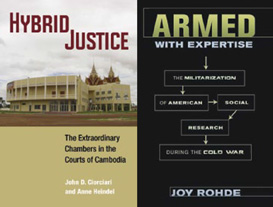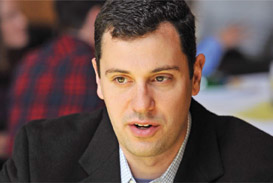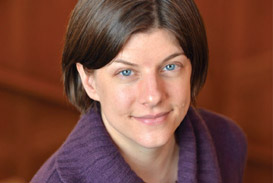
Two new books from Ford School faculty members John D. Ciorciari and Joy Rohde deepen our understanding of international criminal justice systems and the role social scientists have played, for better or for worse, in American national security.
In Hybrid Justice: The Extraordinary Chambers in the Courts of Cambodia, Ciorciari, assistant professor of public policy, and Anne Heindel, legal advisor at the Documentation Center of Cambodia, examine the hybrid tribunal created by the United Nations and the Cambodian government to try key Khmer Rouge officials for crimes in the Pol Pot era. In the book, published in February 2014 by the University of Michigan Press, the authors argue that the contentious politics behind the tribunal's creation, its flawed legal and institutional design, and frequent political impasses impaired the court's ability to deliver credible justice.

During a panel on the book at the East-West Center in Washington, DC, Ciorciari discussed lessons that can be learned from the Cambodian experience, stating: "the UN has undeniably a weak structural position in this court, but it's still chosen to interpret its mandate narrowly, conservatively, deferring in most cases to Cambodian sovereignty and prerogative. So the lesson here is that if the UN gets involved, it needs to exert ownership and stronger control."
Hybrid Justice has received significant praise from legal scholars. Steven R. Ratner, University of Michigan Law School and member of the UN Secretary-General's Group of Experts for Cambodia, writes "John Ciorciari and Anne Heindel have written the definitive study of a highly controversial experiment in accountability for human rights atrocities…this study makes a profound contribution to the scholarship and policy debates within fields ranging from international criminal justice to comparative politics."

In Armed with Expertise: The Militarization of American Social Research during the Cold War, Joy Rohde investigates the Cold War origins and contemporary consequences of the Pentagon's social science research contracting system.
Rohde, a new Ford School assistant professor, describes the rise, fall, and resurgence of social scientists' involvement in U.S. military research. The book shows that the expulsion of military-funded social science research from university campuses in response to '60s-era protests created a rift between the academy and the military. "That rift," says Rohde, "has yet to be mended, much to the detriment of America's international reputation."
The book, published in September 2013 by Cornell University Press, raises questions about the quality of the social science research that the national security state relies upon. It also raises questions about the militarization of domestic life. In his review of the book, Michael Sherry, the Richard W. Leopold Professor of History at Northwestern University, states "Rohde offers especially striking and disturbing material on the blowback of social science collaboration with the armed forces, as individuals and institutions moved beyond addressing threats abroad into assessing domestic disorder and attempting to control it."
Below is a formatted version of this article from State & Hill, the magazine of the Ford School. View the entire Spring 2014 State & Hill here.